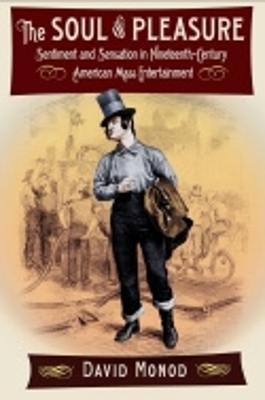
The Soul of Pleasure
Sentiment and Sensation in Nineteenth-Century American Mass Entertainment
Seiten
2016
Cornell University Press (Verlag)
978-1-5017-0238-9 (ISBN)
Cornell University Press (Verlag)
978-1-5017-0238-9 (ISBN)
- Lieferbar (Termin unbekannt)
- Versandkostenfrei innerhalb Deutschlands
- Auch auf Rechnung
- Verfügbarkeit in der Filiale vor Ort prüfen
- Artikel merken
Show business is today so essential to American culture it's hard to imagine a time when it was marginal. But as David Monod demonstrates, the appetite for amusements outside the home developed slowly over the course of the nineteenth century. The Soul of Pleasure offers a new interpretation of how the taste for entertainment was cultivated.
Show business is today so essential to American culture it’s hard to imagine a time when it was marginal. But as David Monod demonstrates, the appetite for amusements outside the home was not "natural": it developed slowly over the course of the nineteenth century. The Soul of Pleasure offers a new interpretation of how the taste for entertainment was cultivated. Monod focuses on the shifting connection between the people who built successful popular entertainments and the public who consumed them. Show people discovered that they had to adapt entertainment to the moral outlook of Americans, which they did by appealing to sentiment.
The Soul of Pleasure explores several controversial forms of popular culture—minstrel acts, burlesques, and saloon variety shows—and places them in the context of changing values and perceptions. Far from challenging respectability, Monod argues that entertainments reflected and transformed the audience’s ideals. In the mid-nineteenth century, sentimentality not only infused performance styles and the content of shows but also altered the expectations of the theatergoing public. Sentimental entertainment depended on sensational effects that produced surprise, horror, and even gales of laughter. After the Civil War the sensational charge became more important than the sentimental bond, and new forms of entertainment gained in popularity and provided the foundations for vaudeville, America’s first mass entertainment. Ultimately, it was American entertainment’s variety that would provide the true soul of pleasure.
Show business is today so essential to American culture it’s hard to imagine a time when it was marginal. But as David Monod demonstrates, the appetite for amusements outside the home was not "natural": it developed slowly over the course of the nineteenth century. The Soul of Pleasure offers a new interpretation of how the taste for entertainment was cultivated. Monod focuses on the shifting connection between the people who built successful popular entertainments and the public who consumed them. Show people discovered that they had to adapt entertainment to the moral outlook of Americans, which they did by appealing to sentiment.
The Soul of Pleasure explores several controversial forms of popular culture—minstrel acts, burlesques, and saloon variety shows—and places them in the context of changing values and perceptions. Far from challenging respectability, Monod argues that entertainments reflected and transformed the audience’s ideals. In the mid-nineteenth century, sentimentality not only infused performance styles and the content of shows but also altered the expectations of the theatergoing public. Sentimental entertainment depended on sensational effects that produced surprise, horror, and even gales of laughter. After the Civil War the sensational charge became more important than the sentimental bond, and new forms of entertainment gained in popularity and provided the foundations for vaudeville, America’s first mass entertainment. Ultimately, it was American entertainment’s variety that would provide the true soul of pleasure.
David Monod is Professor of History at Wilfrid Laurier University. He is the author of Settling Scores: German Music, Denazification, and the Americans, 1945–1953 and Store Wars: Shopkeepers and the Culture of Mass Marketing, 1890–1939.
Introduction
1. Enter Sentimentality: The Origins of the Entertainment Revolution
2. Laugh and Grow Fat: Minstrelsy and Burlesque
3. Looking Through: Sentimental Aesthetics
4. The Democratization of Entertainment: The Concert Saloons
5. Any Dodge Is Fair to Raise a Good Sensation: The Danger and Promise
of Sensationalism
6. Art with the Effervescence of Ginger Beer: The Creation of Vaudeville
7. Spectacle and Nostalgia on the Road: Traveling Shows
Conclusion
| Erscheinungsdatum | 18.07.2016 |
|---|---|
| Zusatzinfo | 10 Halftones, black and white |
| Verlagsort | Ithaca |
| Sprache | englisch |
| Maße | 152 x 229 mm |
| Gewicht | 907 g |
| Themenwelt | Kunst / Musik / Theater ► Theater / Ballett |
| Geschichte ► Allgemeine Geschichte ► Neuzeit (bis 1918) | |
| Geisteswissenschaften ► Geschichte ► Regional- / Ländergeschichte | |
| Geschichte ► Teilgebiete der Geschichte ► Kulturgeschichte | |
| ISBN-10 | 1-5017-0238-6 / 1501702386 |
| ISBN-13 | 978-1-5017-0238-9 / 9781501702389 |
| Zustand | Neuware |
| Haben Sie eine Frage zum Produkt? |
Mehr entdecken
aus dem Bereich
aus dem Bereich
Europa 1848/49 und der Kampf für eine neue Welt
Buch | Hardcover (2023)
DVA (Verlag)
48,00 €
Giordano Bruno - ein ketzerisches Leben
Buch | Hardcover (2024)
C.H.Beck (Verlag)
29,90 €
Kunst und Gesellschaft an der Schwelle zur globalen Welt
Buch | Hardcover (2024)
Klett-Cotta (Verlag)
42,00 €


